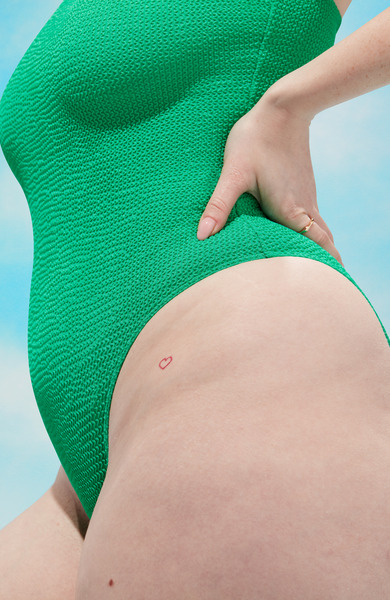
- Cult Beauty launches ‘CAN’T (RE)TOUCH THIS’ campaign to reduce the number of airbrushed model images amid an epidemic of eating disorders and mental health problems among young people
- The brand has written to Prime Minister Rishi Sunak demanding tough new laws regulating the use of enhanced body images
- “We need to stop celebrating flawlessness….spots and wrinkles are normal”
Cult Beauty, part of THG PLC, has launched a campaign to tackle the damaging effects of enhanced beauty images on young people’s mental health.
Digital platforms have fuelled an epidemic of anxiety and eating disorders among women and men alike by promoting exaggerated body shape and altered skin tones.
The number of children being treated for eating disorders on paediatric wards in the UK has more than doubled in the last three years while a recent Mental Health Foundation report found that 35 percent of adults and 31 percent of teenagers in the UK surveyed felt ashamed or depressed because of their body image.
Cult Beauty is committed to taking care of its customers and is taking steps, as part of its CAN’T (RE)TOUCH THIS’ campaign, to minimise online harms and promote healthier attitudes towards beauty standards.
Measures being announced today include:
- Restrictions on retouching imagery shot by Cult Beauty creatives
- A new labelling system on the brand’s digital media and social channels marking its images as ‘un(re)touched’
- Plans for an additional labelling system for third-party, brand partner, and influencer images hosted on-site and on social channels so it’s clear when an image Cult Beauty has supplied is un(re)touched
- Evolved guidelines to ensure diversity and inclusivity sits at the forefront of its branding
- A comprehensive review of Cult Beauty’s language guidelines for copy, to reframe the ‘flaws’ that the industry has historically vilified
Cult Beauty’s campaign aims to display visuals which represent people of all shapes, sizes and colours without the need for digital changes.
The company is supporting a parliamentary bill proposed by MP Dr Luke Evans which would make it mandatory to declare when an image has been digitally tweaked to enhance body proportions. While the Digitally Altered Body Images Bill is before parliament, the beauty company has signed Dr Evans’ Body Image Pledge – a voluntary commitment that they will not digitally alter a person’s body proportions in any direct imagery.
The brand is urging the wider beauty industry to support the bill and sign the pledge.
Lucy Gorman, CEO of THG Beauty, added: “Young people are more vulnerable than ever before to the dangers presented by enhanced body images and unrealistic beauty standards. The damaging impact this can have on a teenager’s self-esteem and mental health are well documented, and as an industry leader we believe we owe it to the beauty industry to have a platform where they can make a difference. The measures announced today are only just the beginning.”
In an open letter to the government co-signed by Mental Health UK, Cult Beauty’s Managing Director, Francesca Elliott, urges ministers to back the proposed new laws, writing, “For too long beauty has been synonymous with a narrow set of, let’s be honest, unattainable ideals. As a society, we’ve celebrated thinness, youth and flawlessness — elevating certain attributes while vilifying everything beyond the strict parameters of ‘perfect’.
“Spots, wrinkles, cellulite, body hair — these are just examples of normal things that have been airbrushed out of ads and model images for decades — meaning to be ‘beautiful’ we have had to reject the reality of our bodies and adapt to a mould that wasn’t made for us.”
Dr. Luke Evans MP commented on the campaign, he said: “Research on the impact of social media and distorted images is substantial and alarming. We believe change needs to be made from the top down, which is why I’m delighted Cult Beauty have signed the Body Image Pledge and are helping to lead the way on this issue.”
To support Cult Beauty in its quest to challenge the beauty narrative you can sign this petition to call for image transparency. And for the beauty industry, you can commit to signing the voluntary Body Image Pledge and taking the first, proactive steps towards fostering greater acceptance.”








